Pintupi dialect facts for kids
Quick facts for kids Pintupi |
||||
|---|---|---|---|---|
| Native to | Australia | |||
| Region | Western Australia, Northern Territory; Papunya settlement, Yuendumu and Kintore, Balgo hills | |||
| Ethnicity | Pintupi =? Ildawongga, ?Wenamba | |||
| Native speakers | 271 (2021 census) | |||
| Language family |
Pama–Nyungan
|
|||
| Dialects |
Pintupi-Luritja
|
|||
| AIATSIS | C10 Pintupi | |||
 |
||||

|
||||
|
||||
Pintupi is an Australian Aboriginal language. It belongs to the Wati languages group. This group is part of the much larger Pama–Nyungan family. Pintupi is also considered a dialect of the Western Desert language.
The Pintupi people are Indigenous people. Their traditional lands are in the desert areas of Western Australia and the Northern Territory. This area stretches from Mount Liebig to Jupiter Well. In the 1940s to 1980s, many Pintupi people moved to communities like Papunya and Haasts Bluff. The very last Pintupi people to live their traditional desert lifestyle came to Kiwirrkura in 1984.
Recently, many Pintupi people have moved back to their traditional lands. They have set up new communities. These include Kintore (called Walungurru in Pintupi) in the Northern Territory. They also established Kiwirrkura and Jupiter Well (called Puntutjarrpa in Pintupi) in Western Australia.
Children born in Papunya and Haasts Bluff grew up speaking a new kind of Pintupi. It is now known as Pintupi-Luritja. This happened because they were close to speakers of other languages. These languages included Arrernte, Warlpiri, and other Western Desert dialects. Today, most Pintupi people speak Pintupi-Luritja. However, there are still differences between the western and eastern ways of speaking.
Pintupi is one of the stronger Aboriginal languages. It is taught to local children in schools. This helps keep the language alive and well.
Contents
Sounds of Pintupi
Every language has its own special sounds. These sounds are like the building blocks of words. The study of these sounds is called phonology. For Pintupi, linguists K. C. and L. E. Hansen studied its sounds in the 1960s.
Consonants
Pintupi has 17 different consonant sounds. Consonants are sounds made by blocking air in your mouth. Think of sounds like 'p', 'k', or 'm'. The way Pintupi sounds are written down is called its orthography. This writing system helps people read and write the language.
Vowels
Pintupi has six vowel sounds. Vowels are sounds made with an open mouth, like 'a', 'e', 'i', 'o', 'u'. In Pintupi, some vowel sounds can be short, and some can be long. For example, 'a' can be short, or 'aa' can be long.
Writing System
The Hansens created a writing system for Pintupi. This system is used in books, dictionaries, and even in schools. It helps Pintupi speakers learn to read and write their own language.
Word Structure
Pintupi words are built in a special way. Each part of a word, called a syllable, usually has a consonant and a vowel. For example, 'ka-na' has two syllables. Long vowel sounds usually appear only at the beginning of a word.
Word Stress
When you say a Pintupi word, you put more emphasis on the first part. This is called stress. For example, in the word 'Pintupi', the stress is on the 'Pin' part. Sometimes, other parts of a long word might also get a smaller stress.
Works in the Language
Universal Declaration of Human Rights
In 2015, Pintupi-Luritja became the first Indigenous Australian language to have a full translation of the Universal Declaration of Human Rights. This important document talks about the rights everyone should have. Elders and language experts at the Australian National University worked together on this translation.
Here is Article 1 of the Declaration in Pintupi-Luritja: Nganana maru tjuta, tjulkura tjuta, manta yurungka parrari nyinapayi tjutanya liipulala nyinanyi, nganana yanangu maru tjuta wiya kuyakuya. Yuwankarrangkuya palya nintingku kulini. Tjanaya palya kutjupa tjutaku tjukarurru nyinanytjaku, walytja tjuta nguwanpa, mingarrtjuwiya. Tjungungku palyangku kurrunpa kutjungku. Wangka ngaangku nganananya tjakultjunanyi rapa ngaranytjaku kutjupa tjuta nguwanpa.
This means: "All human beings are born free and equal in dignity and rights. They are endowed with reason and conscience and should act towards one another in a spirit of brotherhood."
See also
 | John T. Biggers |
 | Thomas Blackshear |
 | Mark Bradford |
 | Beverly Buchanan |

